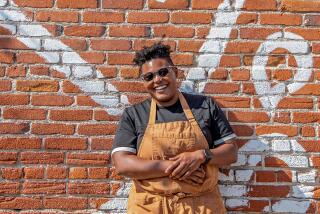We checked in with people and businesses we profiled during the pandemic. Here’s how they’re faring
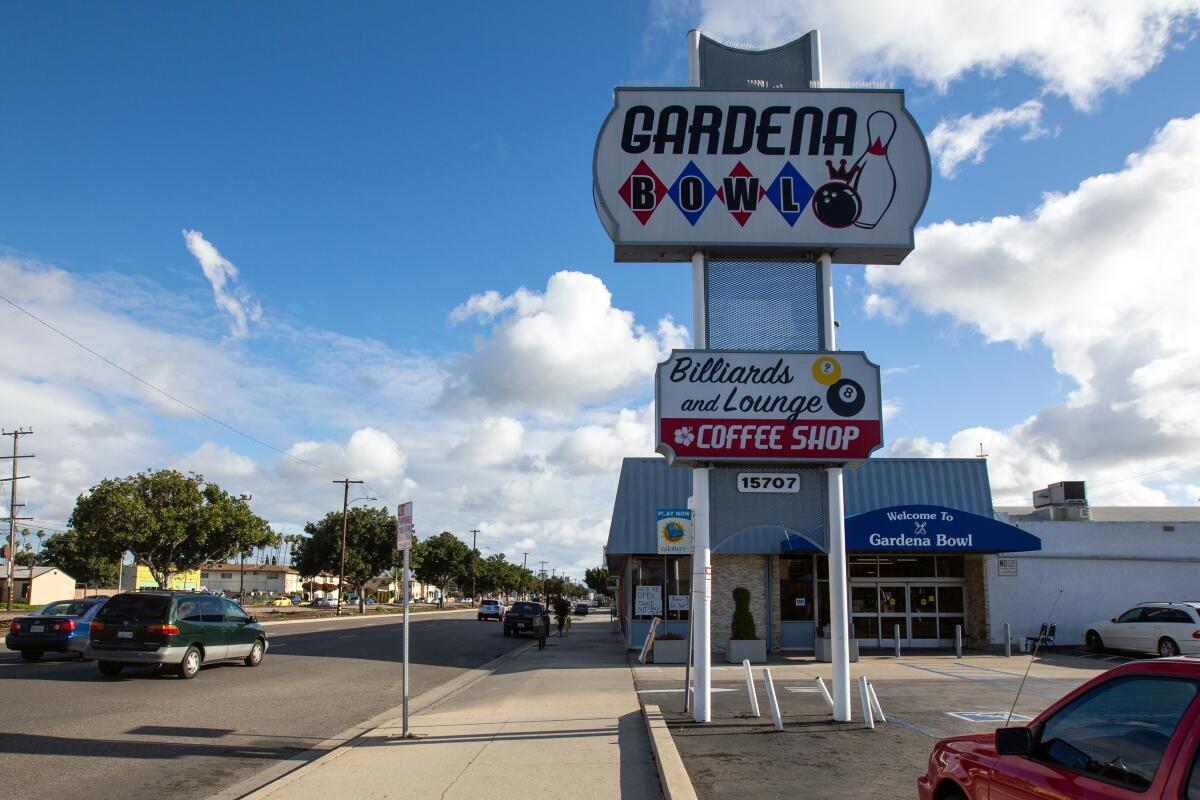
- Share via
For almost everyone in and around the restaurant industry, it has been an excruciating 16-month rollercoaster of shutdowns, reopenings, health concerns and attempts to navigate confusing policy and bewildering inaction on local and federal levels. As the dust settles, as many as 30% of California’s restaurants may be gone for good.
During the pandemic, we spoke to dozens of people: restaurant owners, servers, chefs, street vendors and suppliers. Almost all painted a picture of hardship but also resolute determination to fight another day — and serve another meal.
I followed up with a handful of the people we’ve featured to see how they’re doing: to ask how their businesses weathered the pandemic, how they’re faring mentally and what their attitudes are moving forward.
::
In December, Kwini Reed, co-owner of Poppy + Rose in downtown L.A., was girding for a long winter. A loan from the Paycheck Protection Program, which rolled out nine months prior, had helped, but she was frustrated by the strings that came attached — having to earmark the majority of the money for payroll instead of other expenses like rent. But she and her husband, Michael, have done well enough to expand. Two months ago, they opened their second restaurant, Poppy + Seed, in Anaheim.
In the wake of last month’s statewide reopening, Reed describes getting things up and running as “difficult,” noting it’s been hard to find and keep employees. She doesn’t blame them, however.
“Mentally, people are drained,” she said, noting that the pandemic prompted many restaurant employees to reevaluate working in a notoriously difficult industry. “The break that we had gave a lot of clarity in their lives.”
And there’s more stress in store for current employees. Being short-staffed means longer waits for diners, who can get impatient, making restaurant jobs even more taxing.
Reed believes that addressing mental health in the industry has to be a priority. “People are different. We have changed. We have gone through a traumatic experience,” she said.
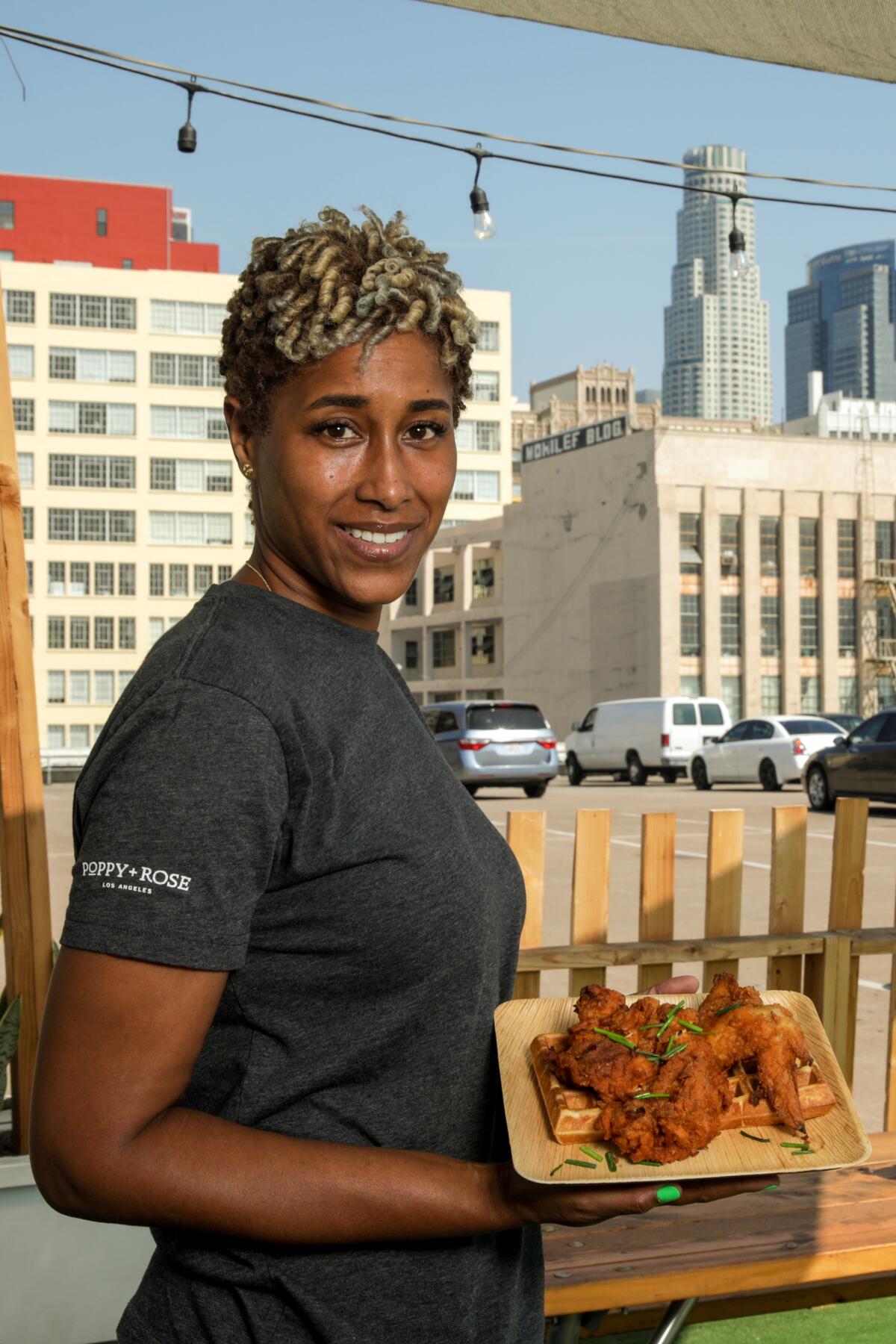
She’d like to be able to pay her employees more, she said, but can’t afford to. And she certainly can’t compete with the likes of Disneyland, which she said has hired away some of her employees. “They have so many great perks,” she said. “We can’t compete with that. We don’t have Disney money.”
Many restaurant workers have to take more than one job to make ends meet. “Rent is too high, gas is too high,” Reed said. “People shouldn’t have to work two or three jobs to live.”
What would help her businesses, she said, would be a government subsidy that she could use specifically to increase employee wages — from $15 to $20 per hour — to compete with bigger companies that can pay more. “That would help us little guys out a whole lot,” she said.
--
“I really feel like Ronan became the best version of itself during the pandemic,” said Caitlin Cutler, co-owner of the West Hollywood pizzeria. “From a creative place, we really had to focus on what the customer wanted, which really took the ego out of it.”
She attributes Ronan’s endurance of the last year to the hard work of her staff, as well as luck — they serve pizza, which naturally lends itself to takeout and delivery, and the restaurant already had an outdoor patio. “Every pivot we had to make was small.”
“Survivor’s guilt is the best way to say it,” Cutler said. “Because for us, it was pure luck.”
It wasn’t all easy — Cutler crusaded against high delivery app fees from the likes of Postmates and Grubhub, which can take a third of the price of an order, writing an op-ed for Life & Thyme in which she disclosed that Ronan had spent $35,000 on delivery app fees in 2020. “It’s simply not sustainable,” she wrote.
Her solution? Ronan raised its prices by 20% on delivery-app orders. And so far, it’s worked out. “The numbers haven’t tapered off the way I thought they would,” she said.
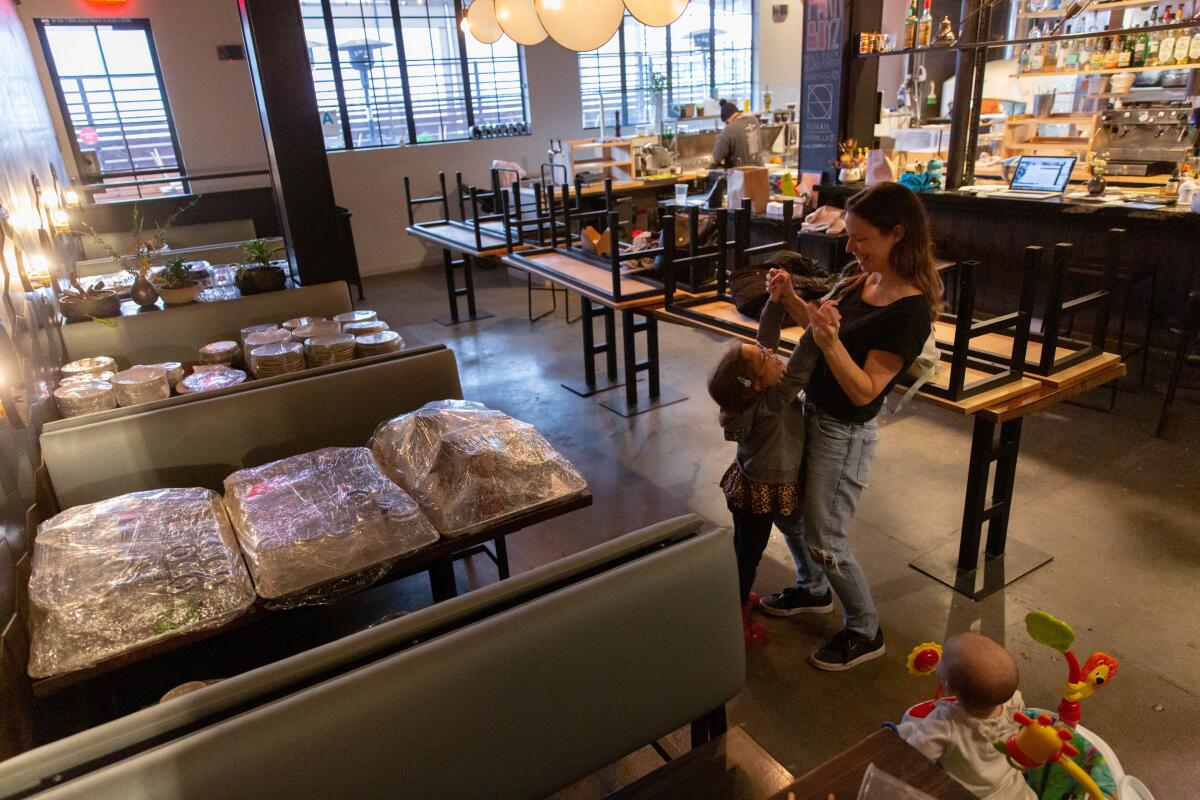
Cutler’s mother recently died, which has factored into a reassessment of her priorities. She and her husband, Daniel, now usually take turns being at the restaurant. “Do I want to spend five nights away from my kids after my mom passed away? Absolutely not.”
That freedom extends to her staff as well, as she tries to accommodate work-life balance. “People want to travel, they want to see their loved ones, have their weddings,” she said.
Cutler has emerged from the pandemic with her passion for the industry intact — but slightly transformed.
“I still love restaurants more than anything… But I’ve realized there have to be boundaries,” she said. “And I can’t give 100% to it or else everything suffers.”
--
Mariscos Jalisco, known for its celebrated shrimp tacos dorados, has made it through the pandemic slightly shaken but intact. “We missed the big events,” said owner Raul Ortega, noting a drop in revenue due to the cancellation of in-person gatherings. (Mariscos Jalisco has three working food trucks and a restaurant in Pomona.)
But after the initial shock of the shutdown, Ortega says the situation at Mariscos Jalisco was not as dire as it was at some other businesses. “People who closed the restaurants had no choice,” he said. “We were very lucky we had the truck outside.” He had planned pay cuts for his employees but never was forced to do it. “I told people we would cut salaries in half, just in case,” he said. “But fortunately we didn’t.”
Ortega said he didn’t apply for a PPP loan. “We were not as down as other people,” he explained. In addition, unlike many restaurants, he didn’t start delivery. “I’d be losing money if I gave 30%,” he said, referring to the app delivery fees.
One bright spot during a difficult year? “I became a citizen six or seven months ago,” said Ortega, a native of Jalisco, Mexico. “We have a lot of opportunities here we don’t get in our country. I don’t think I could have done my business anywhere else.
“I’m just blessed,” he added. “This country is very giving.”
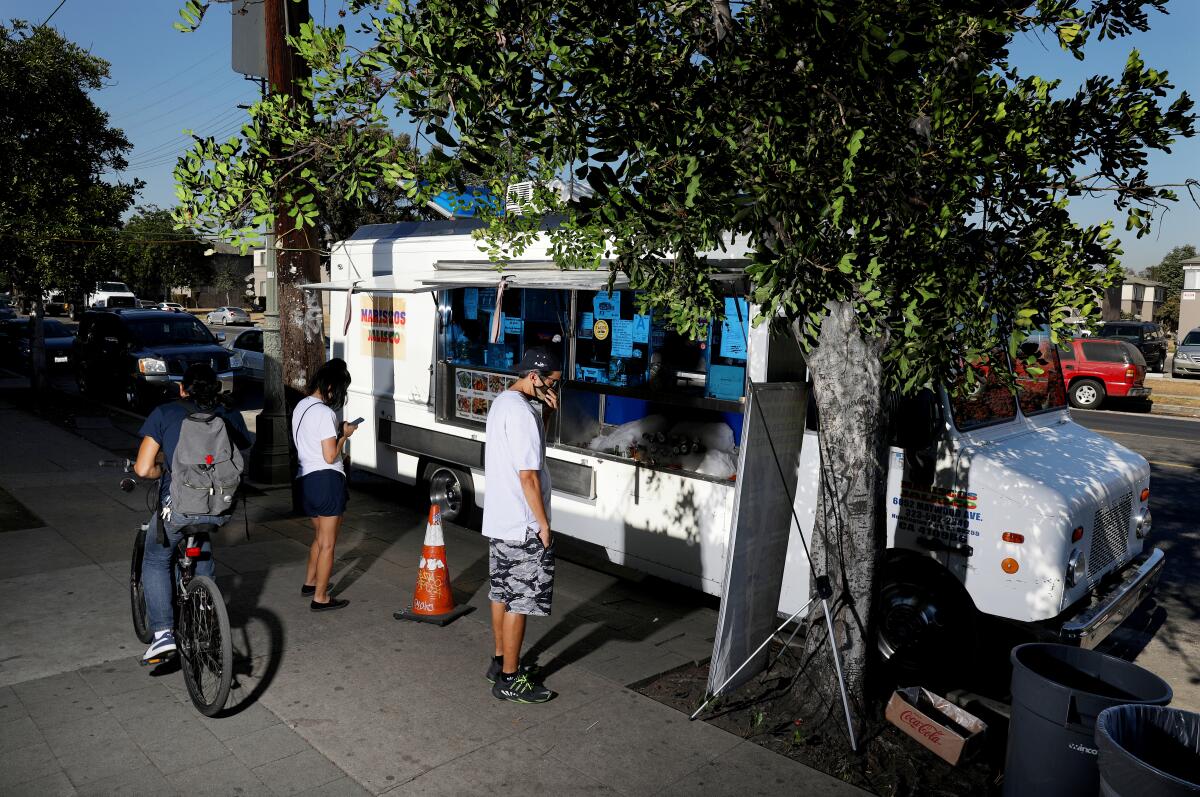
--
Last June, we profiled Anthony Suggs, a Long Beach native who was sentenced to more than six years in prison for a nonviolent marijuana offense but was subsequently released after recreational use became legal in California. He opened a food truck, Antidote Eats, which debuted in March 2020 just prior to the pandemic shutdown.
At the beginning of December, when coronavirus cases were surging dramatically, a new stay-at-home order was imposed in Southern California. For Suggs, it meant closing the truck. “We said, ‘We don’t have any more gigs.’ The rent was coming up and that was like $3,000. We’re not even making that in a week right now.”
Antidote Eats is “on pause right now.”
Unlike many restaurants and food trucks, Suggs was not eligible for government aid via a PPP loan last year. Businesses had to show they were in operation prior to Feb. 15, 2020, and Suggs didn’t debut his truck until the following month, right before the first shutdown. “That was designed to strangle people like me,” he said.
Despite the hardship, Suggs says he intends to revive the business soon. In the meantime, he’s focusing on his music and other projects. He remains, as he was a year ago, upbeat and focused.
“All positivity, all good vibes,” he said.
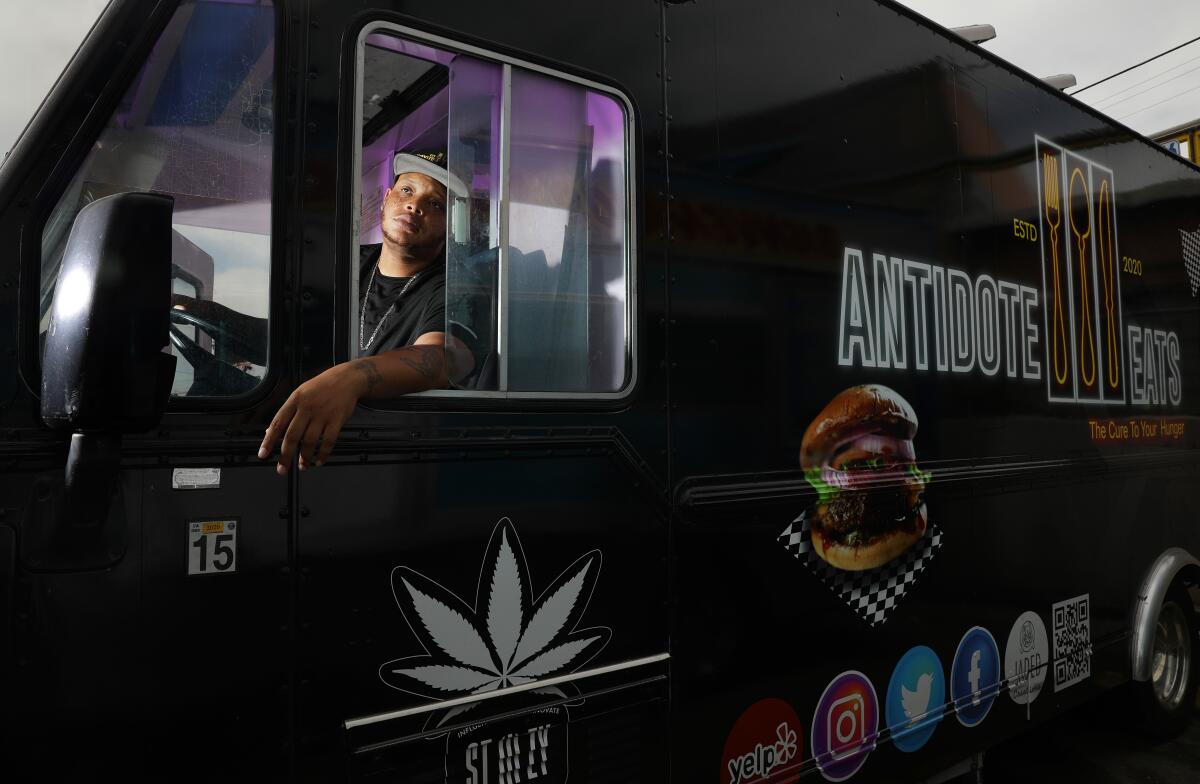
--
Justin Zemlyansky joked that after a March 2020 Times article and video chronicling his job as a bike courier for delivery apps like Grubhub and Doordash, friends credited him with their work getting slightly busier. But things have leveled off since then.
Zemlyansky had been working for three years as a courier and has seen his paychecks shrink over time. As an independent contractor, he was paid per delivery, plus tips, but was not receiving protections afforded to employees under California labor law, including minimum wage, sick leave and workers’ compensation. The passage of Assembly Bill 5 in 2019 — which would have required many app-based workers to be classified as employees — could have changed that.
However, the passage of Proposition 22 last November allowed ride-hail and delivery apps to skirt AB5 and continue to treat workers as independent contractors. App companies, which poured more than $200 million into pushing the initiative through, heralded Proposition 22’s passage as a win for everyone. They even touted a guarantee that workers would make 120% of minimum wage — with one major catch. The guarantee only applied for “engaged time” — time spent actively on a trip or delivery. During slow periods, large swaths of time can pass between deliveries.
The result is that little has changed for Zemlyansky. “Sometimes at the end of the week I’ll get $50 extra,” he said. But he’s still making about the same money now as he was last March: $800 per week or “if I really push it, I could probably pull off $1,200.”
“I would personally be OK with getting minimum wage and being able to keep 100% of my tips,” he said. (Minimum wage is $15 per hour in Los Angeles.)
Not that customers have necessarily developed better tipping habits. “A lot of people don’t tip; that’s a thing,” Zemlyansky said 16 months ago. Did customers’ tipping habits improve as the pandemic went on?
“Honestly, not really.”
Most customers just aren’t willing to pay even more on top of what it costs to get their food delivered, he said. “Do you really want to turn a $12 burrito into a $15, $20 burrito?”
Zemlyansky said he’s happy to keep delivering for the time being (“You gotta pay the rent, right?”) but has been discouraged by some of the apps’ business practices. Clauses in DoorDash’s terms of service, for example — seemingly for the purpose of discouraging class actions and mass arbitration — have grown increasingly complex over the years.
Several major app companies began offering sick and hazard pay after the pandemic outbreak, but the process of accessing the funds proved labyrinthine for some. Zemlyansky also said that workers discussed feeling hesitant to apply for sick pay in private Facebook groups, fearing they would have a difficult time being reinstated on the app once they had healed.
But Zemlyansky, who is fully vaccinated, said that despite the health risks involved with constant contact with strangers, there’s another side to that coin — keeping sane through human interaction. “I, unlike a lot of people, have had lots of social interactions due to work. So I didn’t entirely lose my mind,” he said, laughing.
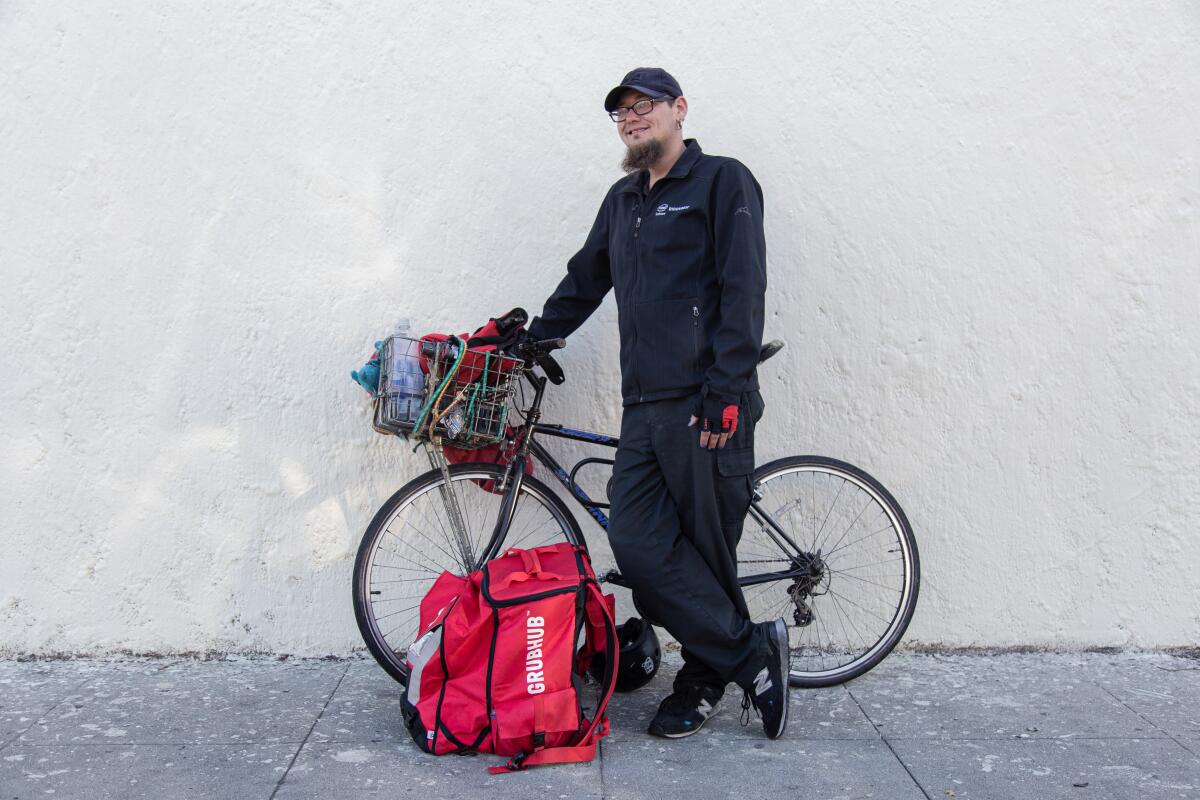
--
The Gardena Bowl Coffee Shop has its fortunes closely tied, as one might expect, to the Gardena Bowl in which it is located — the bowling alley and pool hall that opened in 1948. When Gardena Bowl closed and remained closed for more than a year, it hit business at the coffee shop hard.
When The Times spoke to co-owner Frank Nakano last March, he estimated that the immediate drop-off in business at the restaurant, loved by locals for its Japanese and Hawaiian specialties, was at least 50%.
Nakano said that business has not yet completely recovered but that many diners, particularly some older regulars, are beginning to come in again. “Just to see their faces again is really heartwarming. It’s kind of like getting back together with your family, in a way.”
Nakano attributes the coffee shop’s survival to a PPP loan as well as a grant from the Restaurant Revitalization Fund, a $28.6 billion program that was part of the Biden administration’s larger American Rescue Plan Act.
He also credits the restaurant’s landlords, who discounted the rent without Nakano having to ask. “It’s really helpful if you have landlords that are willing to help out,” he said.
Certain things about running the business have changed, though — possibly permanently. Last call at the restaurant is now 90 minutes earlier than it used to be. And Nakano anticipates having to raise menu prices soon because of increasing costs — $20 worth of Hawaiian sweet bread now costs $25, he said.
But the pandemic hasn’t shaken his faith in restaurants — if anything, it’s strengthened it. “The persona of the community really relies on restaurants. People need places to go out and eat,” he said.
“Breaking bread and sharing food is something that is so vital to our experience.”
More to Read
Eat your way across L.A.
Get our weekly Tasting Notes newsletter for reviews, news and more.
You may occasionally receive promotional content from the Los Angeles Times.


